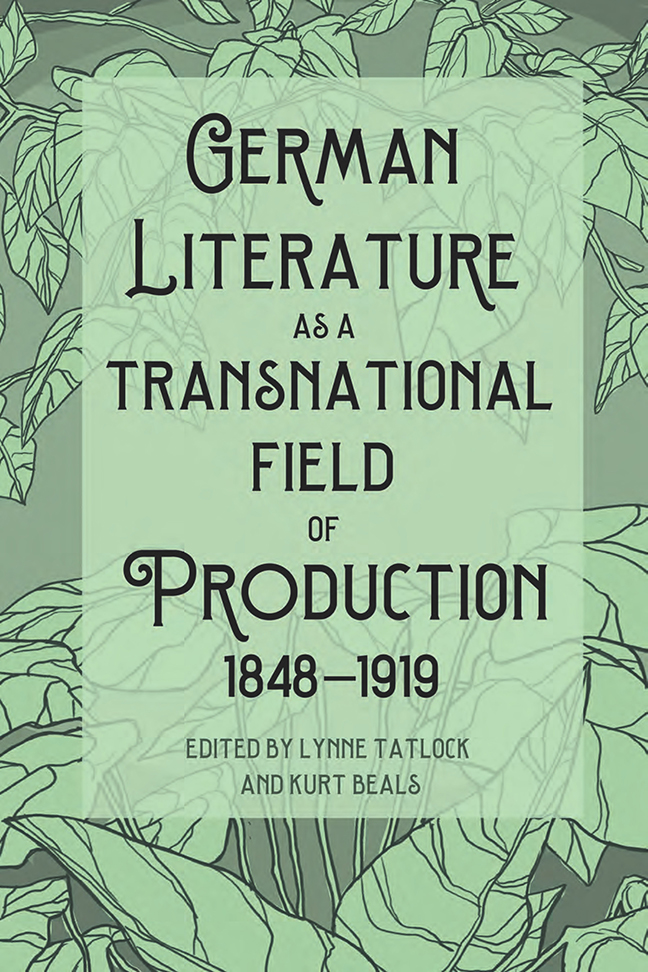Book contents
- Frontmatter
- Contents
- Acknowledgments
- Introduction: A Transnational Literary Field in the Age of Nationalism
- 1 The Passion of Johannes Scherr: Historiography as Trauma
- 2 Between Integration and Differentiation: On the Relationship between German and Austrian Literature in the Second Half of the Nineteenth Century
- 3 Reading Stifter in America
- 4 Travel Writing and Transnational Marketing: How Ida Pfeiffer brought the World to Austria and Beyond
- 5 Ernst Brausewetter's Meisternovellen Deutscher Frauen (1897–98): Gender, Genre, and (Inter)National Aspiration
- 6 Arbiter of Nation? The Strange Case of Hans Müller-Casenov's The Humour of Germany (1892/1893)
- 7 Visualizing the End: Nation, Empire, and Neo-Roman Mimesis in Keller and Fontane
- 8 Eurocentric Cosmopolitanism in Thomas Mann's Buddenbrooks
- 9 European Peace from a Transatlantic Perspective: Victor Hugo and Bertha von Suttner
- 10 Hermann Graf Keyserling and Gu Hongming’s Ethics of World Culture: Confucianism, Monarchism, and Anti-Colonialism
- 11 Constructing Symphonic Worlds: Gustav Mahler, Weltliteratur, and the Musical Program
- 12 The Garb of National Literature: Transnational Identities and the Early Twentieth-Century Schriftstreit
- 13 From European Symbolism to German Gesture: The International and Transnational Nationalism of Stefan George's Blätter für die Kunst
- 14 Canon Fire: Dada's Attack on National Literature
- Selected Bibliography
- Contributors
- Index
14 - Canon Fire: Dada's Attack on National Literature
Published online by Cambridge University Press: 10 January 2024
- Frontmatter
- Contents
- Acknowledgments
- Introduction: A Transnational Literary Field in the Age of Nationalism
- 1 The Passion of Johannes Scherr: Historiography as Trauma
- 2 Between Integration and Differentiation: On the Relationship between German and Austrian Literature in the Second Half of the Nineteenth Century
- 3 Reading Stifter in America
- 4 Travel Writing and Transnational Marketing: How Ida Pfeiffer brought the World to Austria and Beyond
- 5 Ernst Brausewetter's Meisternovellen Deutscher Frauen (1897–98): Gender, Genre, and (Inter)National Aspiration
- 6 Arbiter of Nation? The Strange Case of Hans Müller-Casenov's The Humour of Germany (1892/1893)
- 7 Visualizing the End: Nation, Empire, and Neo-Roman Mimesis in Keller and Fontane
- 8 Eurocentric Cosmopolitanism in Thomas Mann's Buddenbrooks
- 9 European Peace from a Transatlantic Perspective: Victor Hugo and Bertha von Suttner
- 10 Hermann Graf Keyserling and Gu Hongming’s Ethics of World Culture: Confucianism, Monarchism, and Anti-Colonialism
- 11 Constructing Symphonic Worlds: Gustav Mahler, Weltliteratur, and the Musical Program
- 12 The Garb of National Literature: Transnational Identities and the Early Twentieth-Century Schriftstreit
- 13 From European Symbolism to German Gesture: The International and Transnational Nationalism of Stefan George's Blätter für die Kunst
- 14 Canon Fire: Dada's Attack on National Literature
- Selected Bibliography
- Contributors
- Index
Summary
The papers presented at the Transnational Framings symposium (see Acknowledgments) and the essays in this volume have viewed the German-language literary field in the so-called Age of Nationalism from a number of angles, seeking to understand the literary and cultural world of German-speaking Europe during that period not as a self-contained, national literature and culture, but rather as part of an international or transnational cultural configuration. In this essay I will consider how, despite its manifest distortions as a literary-historical model, the notion of a national literature and culture exhibited surprising practical utility in the hands of a group hardly known for their fondness for nations, literature, or culture; I am referring, of course, to the Dadaists. Dada was not only a strikingly international movement, having been founded by expatriates of several European nations during the First World War in Zurich, from which it quickly spread across Europe and to other continents; its members also repeatedly invoked notions of national literature and national culture as targets of their satire and mockery. In this sense, perhaps ironically, these notions served a purpose, providing the Dadaists and other like-minded critics with an apparently unified target for their assault. For all its weaknesses as an analytical category, the idea of a national literature thus had a certain value, not only for its advocates, but also for its adversaries. This essay will thus examine how the concept of national literature and culture was productively turned on its head by the transnational antinationalism of the Dada movement.
It is hardly surprising or controversial to note that the Dada movement did not neatly conform to the paradigm of national literature that dominated in the late nineteenth and early twentieth centuries, the period when the movement's German-speaking members were receiving their literary education. Even the most cursory summary of Dada generally characterizes it as a movement that reveled in nonsense and rejected art, war, and nationalism. In a passage from his retrospective account of the movement that has become canonical, Hans Arp writes: “Angeekelt von den Schlächtereien des Weltkrieges 1914 gaben wir uns in Zürich den schönen Künsten hin.
- Type
- Chapter
- Information
- Publisher: Boydell & BrewerPrint publication year: 2023

